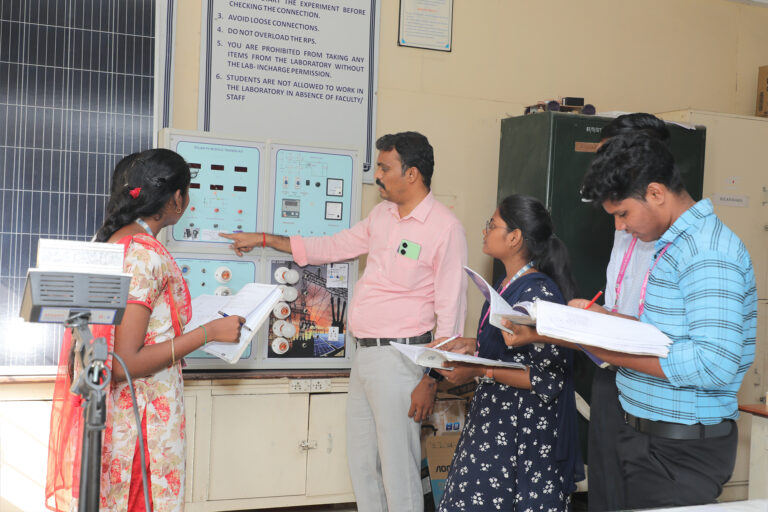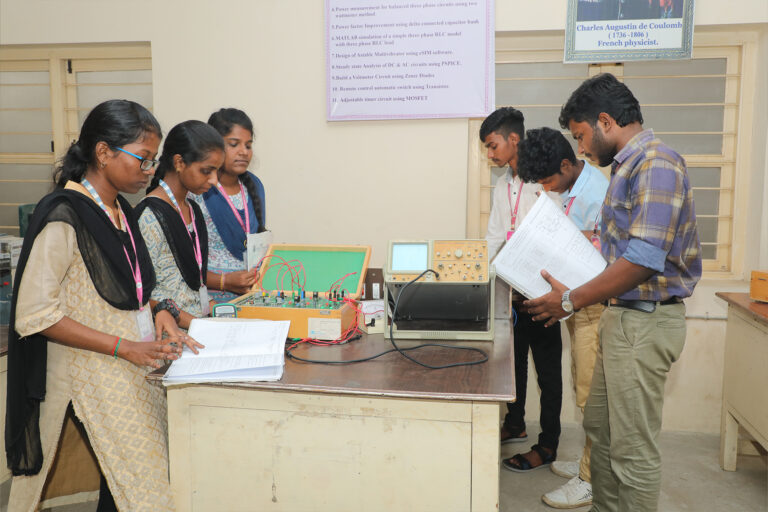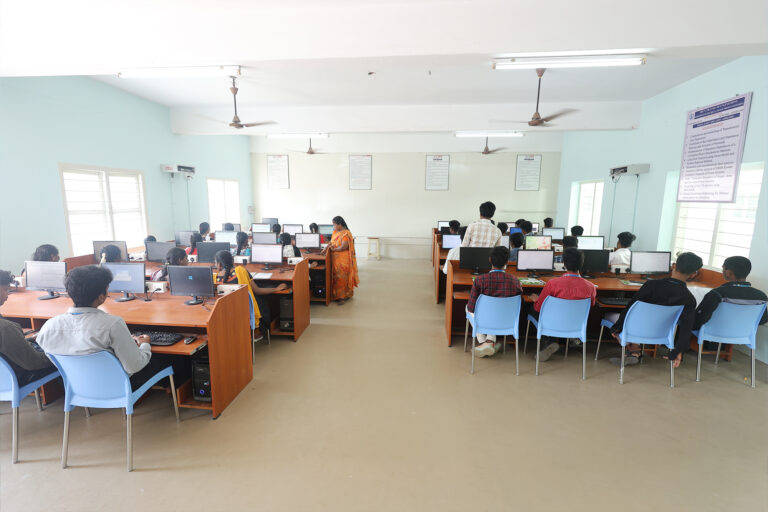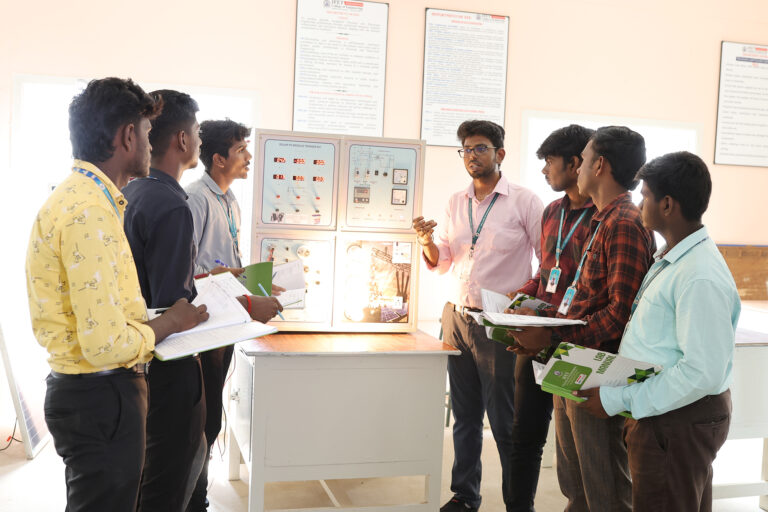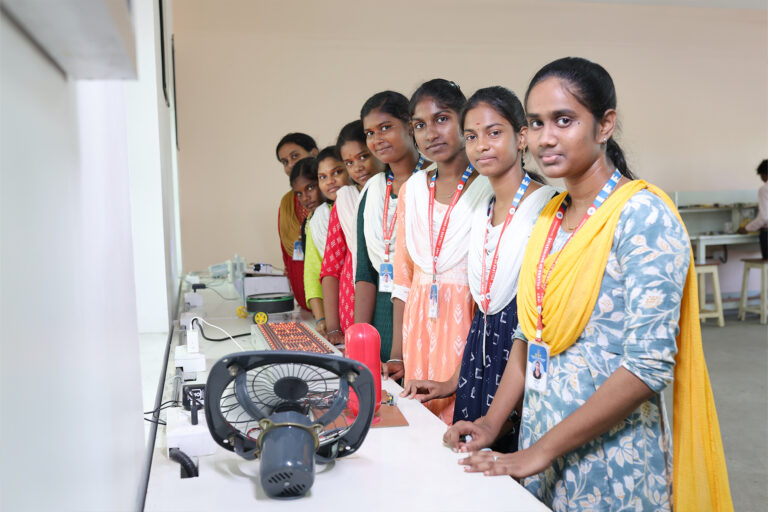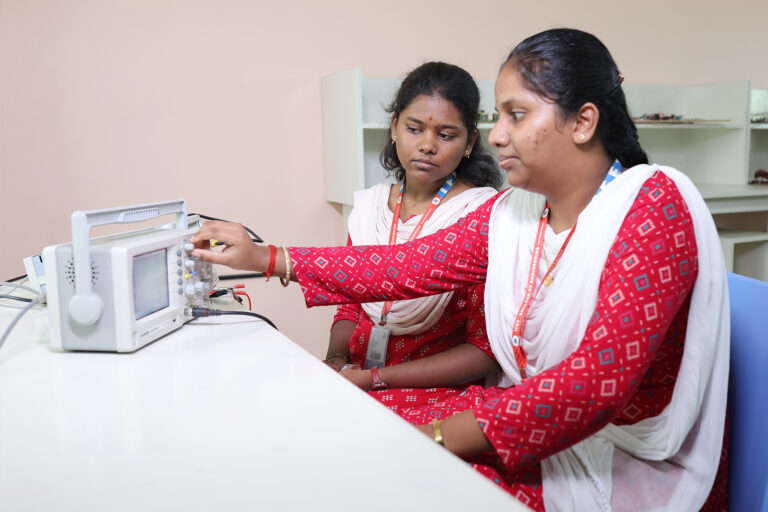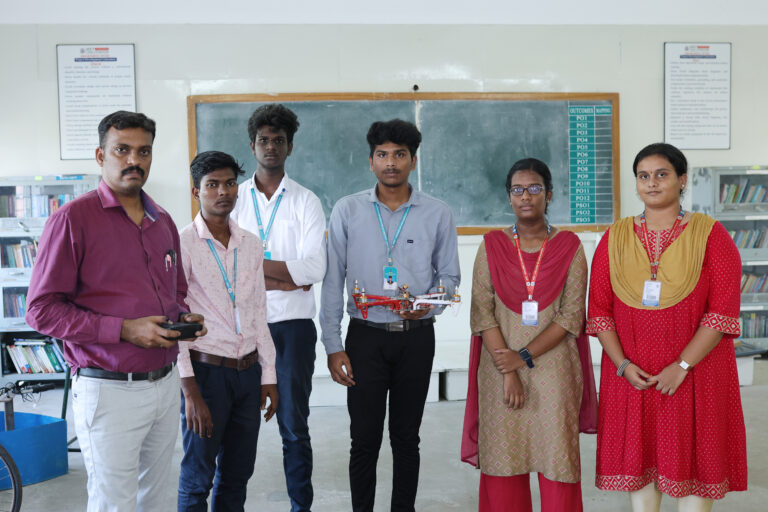
Dr. T. Ram Pradesh
HoD (EEE)
The Electrical and Electronics Engineering (EEE) department, established in 1998, has been a cornerstone of IFET since its inception. With a team of highly qualified and experienced faculty, the department emphasizes a balance of theoretical concepts and practical knowledge, fostering creativity and innovation among students. The curriculum focuses on key areas like power generation, transmission, and electronic systems, while also incorporating modern software tools to enhance programming skills, computing knowledge, and problem-solving abilities using cutting-edge technologies. The department is tailored to meet industry trends, with specializations in Electric Vehicles and Smart Systems. Advanced labs and research facilities promote innovation, enabling students to pursue research and consultancy with industries. Students gain professional skills through active participation in associations like ISTE and IEEE, preparing them for diverse roles in software and hardware industries, including positions such as Design Engineer, Project Engineer, Software Engineer, and Research Engineer. Graduates emerge as industry-ready professionals, equipped to contribute effectively to society through technology.
Department Vision
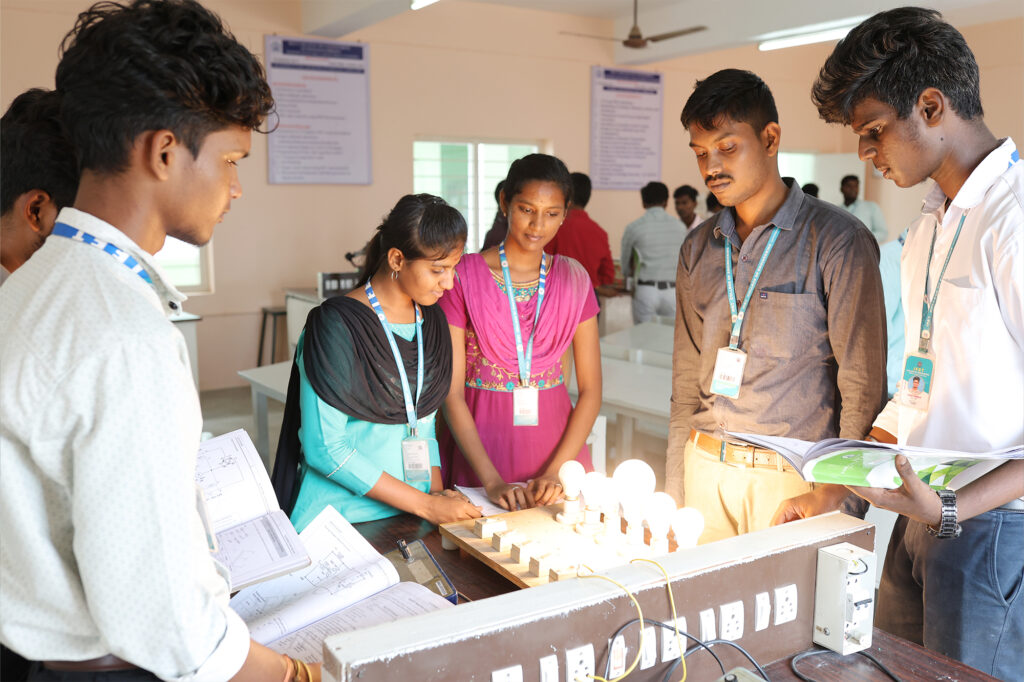
To develop globally recognized Electrical and Electronics Engineering professionals through exceptional education, industry collaboration and innovative research, aligning with the Institute’s commitment to excellence.
Department Mission
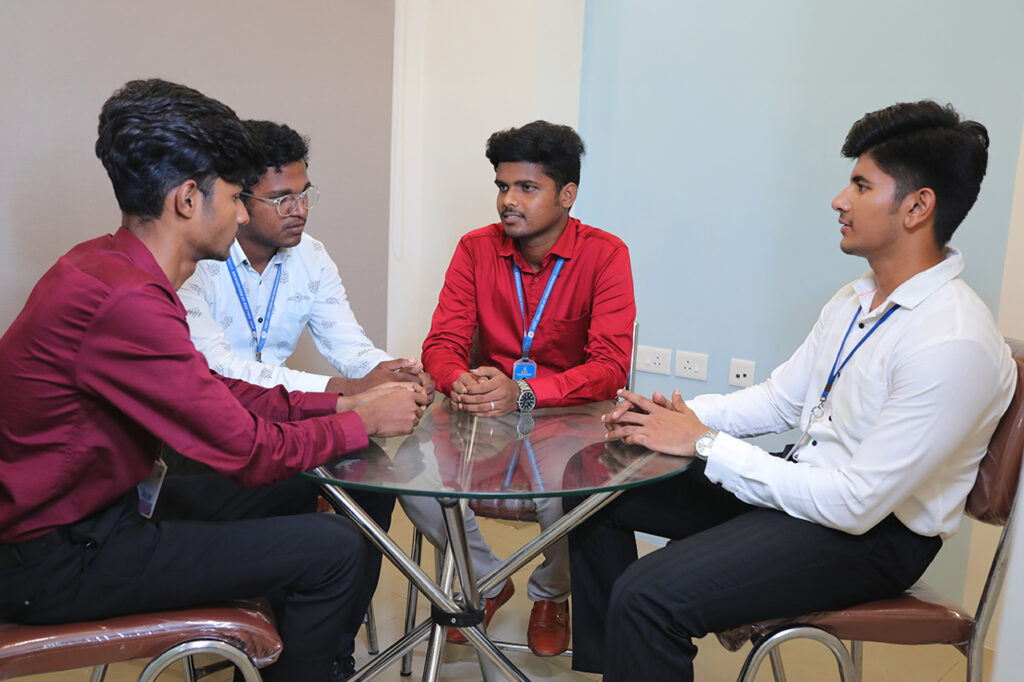
Developing and delivering a well-balanced, innovative curriculum to cater to the needs of the industry and society and to prepare quality professionals in Electrical and Electronics Engineering.
Establishing state-of-the-art facilities to enhance excellence in teaching, learning, and innovative research.
Equipping students with ethics, values, skills and a commitment to lifelong learning, necessary for success in a global environment.
Collaborating with industries to offer students relevant, real-world experiences.
Promoting globally impactful research to tackle modern technological challenges.
Empowering students with innovation, leadership and entrepreneurship to foster holistic growth.
Department Activities
FDP on Future Innovations: Energy & Sustainability
Dr. T. Rampradesh, ASP/EEE, actively participated in the Faculty Development Programme titled “Future Innovations: Energy and Sustainability” organized by National Institute of Technology Durgapur from 12th to 17th January 2026.
05 Feb, 2026
FDP on Quantum Communication
Dr. T. Rampradesh, ASP/EEE, actively participated in the Faculty Development Programme titled “Quantum Communication: Recent Progress and Future Research” organized by National Institute of Technology from 19th to 24th January 2026.
05 Feb, 2026
Webinar on Underwater Robotics
Dr. M. Saravanan, Professor/EEE, actively participated in the webinar titled “Underwater Robotics: Challenges and Opportunities” organized by Arunai Engineering College on 2nd January 2026.
05 Feb, 2026
FDP on AI & IoT in Smart Renewable Energy
Dr. R. Suganya, ASP/EEE, actively participated in the Faculty Development Programme titled “AI & IoT Integration in Smart Renewable Energy Networks” organized by R. P. Sarathy Institute of Technology from 19th to 24th January 2026.
05 Feb, 2026
Workshop on Remote Pilot Training (Drone)
Mr. Sakthivel S, and Mr. Ranjith M successfully participated in the Workshop on Remote Pilot Training (Drone) held at Velammal Engineering College, Chennai, on 31st January 2026.
05 Feb, 2026
Workshop on Remote Pilot Training (Drone)
Mr. Sakthivel S, and Mr. Ranjith M successfully participated in the Workshop on Remote Pilot Training (Drone) held at Velammal Engineering College, Chennai, on 31st January 2026.
05 Feb, 2026
Program Educational Objectives
PEO 1
Graduates will adapt to contemporary technologies and apply technical expertise in Electrical and Electronics Engineering to address national and global challenges in energy conservation and sustainability.
PEO 2
Graduates will pursue lifelong learning, advanced studies and successful careers in Electrical, Electronics and allied fields.
PEO 3
Graduates will excel in multidisciplinary projects, demonstrating professionalism, teamwork, leadership, ethics and effective communication.
Program Outcomes
POs describe what students are expected to know or be able to do by the time of graduation from the program. At the time of their graduation, the B.E. Electrical and Electronic Engineering students will have the following abilities.
PO 1. Ability to apply knowledge of mathematics, science, and engineering to current technical concepts and practices in the core Electrical and Electronics Engineering.
PO 2. Ability to analyze, identify, formulate and solve simple engineering problems.
PO 3. Ability to design machines, circuits, components or process to meet desired needs within realistic constraints.
PO 4. Ability to conduct experiments, investigate and obtain solution for complex engineering problems and interpret data to provide valid conclusions.
PO 5. Ability to create, select and apply appropriate techniques, resources and use modern engineering tools, including prediction and modeling, to complex engineering activities, with an understanding of the limitations.
PO 6. Ability to understand the impact of engineering solutions on societal health, safety, legal and cultural issues and demonstrate the consequent responsibility relevant to professional engineering practice.
PO 7. Ability to understand the impact of engineering solutions in social and environmental contexts, and demonstrate knowledge needed for sustainable development.
PO 8. Understand and commit to professional and ethical responsibility and norms of engineering practice.
PO 9. Ability to function effectively as an individual and as a member or leader in diverse teams and in multidisciplinary settings, to accomplish a common goal.
PO 10. Ability to communicate effectively with the engineering community and with society at large, such as being able to comprehend and write effective reports and design documentation, make effective presentations and give and receive clear instructions.
PO 11. Demonstrate knowledge and understanding of engineering and management principles and apply these to one’s own work as a member and leader in a team to manage projects and in multidisciplinary environments.
PO 12. Recognize the need for and have the ability to engage in independent and life-long learning.
Program Specific Outcomes
PSO 1
Design and prototype innovative Electrical and Electronics products in electrical power systems, electronics and instrumentation, electrical machines, control systems and power electronics.
PSO 2
Demonstrate knowledge and skills in renewable energy and Electric Vehicles to address global energy needs with a focus on energy conservation and sustainability.
POS 3
Integrate Electrical and Electronics systems with software, Artificial Intelligence and Machine Learning for effective automation and optimized utilization.
Laboratory
The Electrical and Electronics Engineering Laboratory at IFET is designed to equip students with hands-on experience in core electrical and electronics concepts. Featuring state-of-the-art equipment and modern software tools, the lab supports experiments in power systems, electrical machines, control systems, and electronic circuits. It fosters innovation and skill-building through practical exposure, helping students bridge the gap between theory and real-world applications. With a focus on emerging technologies like Electric Vehicles and Smart Systems, the lab empowers students to excel in research, design, and industry-oriented projects.
Department Laboratory Details:
- Electrical Machines Laboratory
- Simulation Laboratory
- Renewable Energy Systems Laboratory
- Electronics and Circuits Laboratory
- Control and Instrumentation Laboratory
- Power Electronics Laboratory
Innovative Teaching
Click here to view – Summary of Innovations by Faculty in Teaching and Learning
Faculty List
| S. No. | Faculty Name | Designation | Degree |
|---|---|---|---|
01 | Dr. P. Pugazhendiran | Professor | Ph.D |
02 | Dr. M. Saravanan | Professor | Ph.D |
03 | Dr. T. Ram Pradesh | Associate Professor | Ph.D |
04 | Dr. P. Vimala | Associate Professor | Ph.D |
05 | Mrs. R. Suganya | Associate Professor | M.E. |
06 | Mr. N. Sivanantham | Senior Assistant Professor | M.Tech. |
08 | Mrs. R. Revathy | Senior Assistant Professor | M.E. |
09 | Mr. V. Mohan | Assistant Professor | M.E. |
10 | Mrs. G. Anbarasi | Assistant Professor | M.E. |
11 | Mrs. A. Eswari | Assistant Professor | M.E. |
Academic Year Wise Faculty List
Click here to view – Faculty List Academic Year Wise.
Board of Studies
| S. No. | Name | Designation | Position | Category |
|---|---|---|---|---|
01 | Dr. P. Pugazhendiran | Professor, Department of Electrical and Electronics Communication Engineering | Chairman | Head of the Department |
02 | Dr. Jeevanandham | Professor, Department of Electrical and Instrumentation Engineering, Pondicherry Engineering College, Pondicherry | Member | Two subject experts from Outside the parent University to be nominated by the Academic Council |
03 | Dr. R. Sundaramurthy | Associate Professor- E&I, Pondicherry Engineering College, Pondicherry | Member | Two subject experts from Outside the parent University to be nominated by the Academic Council |
04 | Dr. G. Uma | Professor, Department of Electrical and Electronics Engineering, College of Engineering Guindy, Anna University, Chennai | Member | Expert nominated by the Vice-Chancellor |
05 | Mr. Mohan Narayanan | Founder & CEO, Kubos Consultancy Services | Member | One Industry / Corporate / Allied area Representative relating to placement |
06 | Mr. D. Dhanraj | Deputy General Manager- Operations, VOLTECH O and M Services Pvt.Ltd. | Member | Post Graduate Meritorious Alumni nominated by the Principal |

